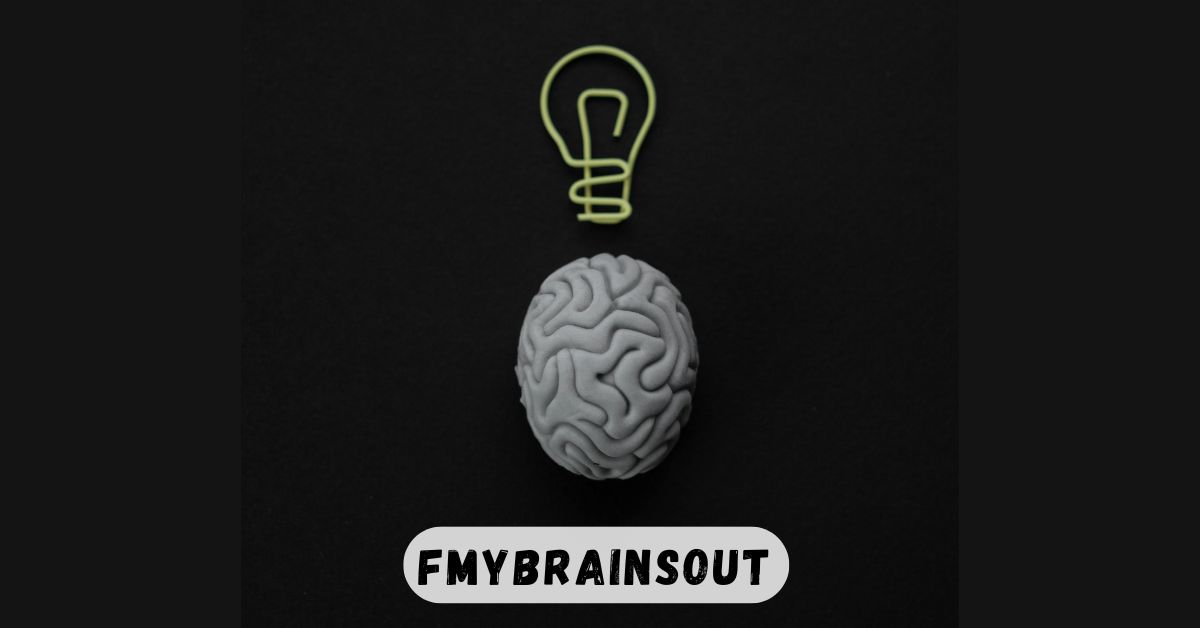Introduction to “FMyBrainsOut”
In the ever-evolving landscape of personal development, the quest for enhanced cognitive function has taken center stage. People are increasingly seeking ways to boost their mental capabilities, improve focus, and increase productivity. The concept of “FMyBrainsOut” has emerged as a popular technique or practice aimed at achieving these goals. But what exactly does it entail? How can one incorporate it into daily life to maximize brain function? This article explores the intricate details of “FMyBrainsOut,” shedding light on its methods, benefits, and practical applications.
The Science Behind Cognitive Enhancement
Understanding Cognitive Functions
To appreciate the significance of “FMyBrainsOut,” it’s essential to first understand what cognitive functions are. Cognitive functions encompass the mental processes that allow us to carry out any task, from the simplest to the most complex. These include memory, attention, perception, problem-solving, language comprehension, and decision-making.
Cognitive enhancement refers to the improvement of these functions through various means, ranging from lifestyle changes to technological interventions. The idea is to push the brain beyond its usual limits, fostering a state of heightened mental acuity.
The Brain’s Plasticity
A critical concept in cognitive enhancement is neuroplasticity—the brain’s ability to reorganize itself by forming new neural connections. This adaptability means that with the right stimulation, the brain can improve its functions and even recover from damage. The “FMyBrainsOut” approach leverages this plasticity, aiming to stimulate the brain in ways that lead to long-term improvements in cognitive performance.
Also Read: Theapknews.shop Health & Beauty: Your Comprehensive Guide
Methods to Implement “FMyBrainsOut”
1. Mental Exercises and Brain Training
One of the cornerstones of “FMyBrainsOut” is mental exercises designed to challenge and stimulate the brain. These exercises can take various forms:
A. Puzzles and Games
Puzzles such as crosswords, Sudoku, and brainteasers are excellent tools for cognitive stimulation. They challenge the brain to think critically, solve problems, and remember patterns, all of which are key components of cognitive enhancement.
B. Memory Training
Memory training exercises, such as memorizing lists or learning new languages, help improve working memory. This type of memory is crucial for reasoning, learning, and comprehension.
C. Mind Mapping
Mind mapping involves creating visual diagrams to organize information. This technique can help enhance creativity, improve memory retention, and simplify complex ideas, making it a valuable tool in the “FMyBrainsOut” toolkit.
2. Physical Exercise
Physical exercise is not just beneficial for the body; it’s also crucial for the brain. Regular aerobic exercise increases blood flow to the brain, promoting the growth of new neurons and enhancing brain function.
A. Aerobic Exercise
Activities like running, swimming, and cycling increase heart rate and blood flow to the brain, which can boost cognitive functions. Studies have shown that aerobic exercise improves memory and learning capabilities.
B. Strength Training
Strength training, such as weightlifting, also plays a role in cognitive enhancement. It has been linked to improved executive functions, which include planning, organizing, and multitasking.
C. Yoga and Meditation
Yoga and meditation are excellent for reducing stress, which can negatively impact cognitive functions. These practices also promote mindfulness, which has been shown to enhance focus and concentration.
3. Diet and Nutrition
The brain requires proper nutrition to function optimally. Certain foods are known to boost brainpower, and integrating them into your diet can be a simple yet effective way to implement “FMyBrainsOut.”
A. Omega-3 Fatty Acids
Found in fish, flaxseeds, and walnuts, omega-3 fatty acids are crucial for brain health. They are involved in building brain cell membranes and promoting the growth of new brain cells.
B. Antioxidants
Antioxidants, found in berries, dark chocolate, and green tea, help protect the brain from oxidative stress, which can lead to cognitive decline. They also improve brain function and memory.
C. Vitamins and Minerals
Vitamins and minerals, such as Vitamin E, B vitamins, and magnesium, are essential for cognitive health. They support various brain functions, including memory, mood regulation, and energy production.
4. Sleep and Rest
Sleep is vital for cognitive function. During sleep, the brain consolidates memories, clears out toxins, and rejuvenates itself for the next day.
A. Importance of Quality Sleep
Quality sleep is essential for cognitive functions like memory and learning. Lack of sleep can lead to cognitive impairments, including difficulties with attention, problem-solving, and decision-making.
B. Napping for Brain Boost
Short naps can also have a positive impact on cognitive function. A 20-30 minute nap can improve alertness and performance without causing the grogginess associated with longer naps.
C. Sleep Hygiene
Maintaining good sleep hygiene is crucial for ensuring restful sleep. This includes having a regular sleep schedule, creating a comfortable sleep environment, and avoiding stimulants before bedtime.
The Role of Technology in “FMyBrainsOut”
1. Brain-Training Apps
With the rise of technology, brain-training apps have become a popular tool for cognitive enhancement. These apps offer various games and exercises designed to improve memory, attention, and problem-solving skills.
A. Popular Brain-Training Apps
- Lumosity: Offers a wide range of games that target different cognitive functions.
- Elevate: Focuses on improving communication and analytical skills.
- Peak: Provides personalized brain training with insights into cognitive performance.
2. Neurofeedback
Neurofeedback is a technique that involves monitoring brain waves and providing real-time feedback to help individuals regulate their brain activity. This can lead to improvements in focus, relaxation, and overall cognitive function.
A. How Neurofeedback Works
During a neurofeedback session, electrodes are placed on the scalp to measure brain waves. The data is then displayed on a screen, allowing the individual to see their brain activity and make adjustments. Over time, this practice can lead to enhanced cognitive control.
3. Cognitive Enhancement Devices
There are also devices designed to stimulate the brain using methods like transcranial magnetic stimulation (TMS) or transcranial direct current stimulation (tDCS). These devices are used to enhance cognitive functions, treat mental health conditions, and improve overall brain performance.
A. Transcranial Magnetic Stimulation (TMS)
TMS uses magnetic fields to stimulate nerve cells in the brain, which can improve cognitive functions and alleviate symptoms of depression.
B. Transcranial Direct Current Stimulation (tDCS)
tDCS involves applying a low electrical current to the brain, which can enhance learning, memory, and attention.
Psychological and Emotional Factors in Cognitive Enhancement
1. Stress Management
Stress is one of the biggest enemies of cognitive function. Chronic stress can lead to a decline in cognitive abilities, including memory, attention, and problem-solving skills.
A. Techniques for Stress Reduction
- Mindfulness Meditation: Helps reduce stress by promoting a state of relaxation and awareness.
- Deep Breathing Exercises: Can quickly reduce stress by calming the nervous system.
- Progressive Muscle Relaxation: Involves tensing and relaxing different muscle groups to relieve stress.
2. Emotional Intelligence (EQ)
Emotional intelligence, or EQ, is the ability to recognize, understand, and manage your emotions. High EQ can lead to better decision-making, improved relationships, and enhanced mental well-being.
A. Developing Emotional Intelligence
Improving EQ involves practices such as self-awareness, empathy, and effective communication. These skills can lead to better cognitive performance by reducing emotional distractions and improving focus.
3. Positive Thinking and Mental Attitude
A positive mental attitude can significantly impact cognitive function. Optimism has been linked to better problem-solving skills, creativity, and overall mental resilience.
A. Cultivating a Positive Mindset
- Affirmations: Repeating positive statements can help rewire the brain for success.
- Gratitude Journaling: Writing down things you’re grateful for can improve mood and cognitive function.
- Visualization: Picturing success can enhance motivation and focus.
Implementing “FMyBrainsOut” in Daily Life
1. Creating a Routine
Consistency is key to cognitive enhancement. Creating a routine that incorporates the various “FMyBrainsOut” techniques can lead to sustained improvements in brain function.
A. Morning Rituals
Starting the day with activities like meditation, mental exercises, or a nutritious breakfast can set a positive tone for the rest of the day.
B. Midday Breaks
Incorporating short breaks throughout the day for physical exercise, napping, or brain-training games can keep the mind sharp and focused.
C. Evening Wind-Down
Winding down with relaxation techniques, such as reading, light exercise, or a warm bath, can promote restful sleep, which is crucial for cognitive function.
2. Tracking Progress
Tracking your progress can help you see the benefits of “FMyBrainsOut” and stay motivated. This could involve keeping a journal, using an app, or simply reflecting on your mental performance.
A. Cognitive Assessments
Periodic cognitive assessments can provide insights into areas of improvement and areas that may need more focus. These assessments can be done through online tools or with the help of a professional.
B. Personal Reflection
Regularly reflecting on your mental performance, mood, and overall well-being can help you make necessary adjustments to your “FMyBrainsOut” routine.
The Future of Cognitive Enhancement
1. Advancements in Technology
As technology continues to evolve, so too will the tools available for cognitive enhancement. Future innovations may include more advanced brain-training apps, wearable cognitive enhancement devices, and even genetic interventions.
A. AI-Powered Cognitive Tools
Artificial intelligence has the potential to revolutionize cognitive enhancement by offering personalized brain-training programs and real-time feedback tailored to individual needs.
B. Virtual Reality (VR) for Cognitive Enhancement
VR technology could offer immersive experiences that stimulate the brain in new and exciting ways, potentially leading to significant cognitive improvements.
2. Ethical Considerations
As cognitive enhancement techniques become more advanced, ethical considerations will become increasingly important. Questions surrounding fairness, accessibility, and the potential for misuse will need to be addressed.
A. Accessibility
Ensuring that cognitive enhancement tools are accessible to everyone, regardless of socioeconomic status, is crucial for ethical implementation.
B. Potential Risks
While “FMyBrainsOut” offers many benefits, it’s essential to consider the potential risks. Overstimulation, dependency on technology, and neglecting basic health needs are risks that should be carefully managed.
Conclusion: Embrace the Journey of Cognitive Enhancement
“FMyBrainsOut” represents a holistic approach to cognitive enhancement, incorporating mental exercises, physical activity, nutrition, sleep, technology, and emotional well-being. By integrating these practices into daily life, individuals can unlock their full cognitive potential and lead more productive, fulfilling lives.
The journey of cognitive enhancement is a continuous process, requiring dedication and mindfulness. However, the rewards—enhanced memory, sharper focus, improved problem-solving abilities, and overall mental well-being—are well worth the effort. Embrace the “FMyBrainsOut” philosophy and take the first step towards maximizing your brain function today.
Read More: Trivise/Health









